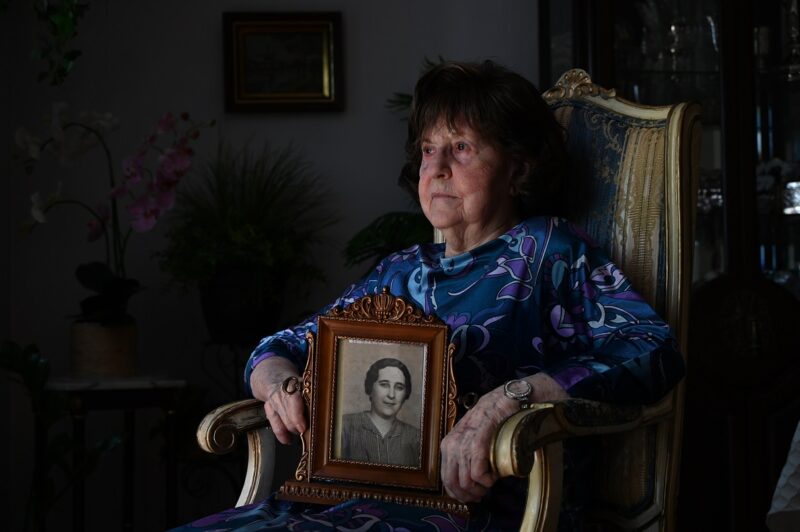
Magda Goldstein
Holocaust Survivor
(The picture shows Rachel, Magda’s mother)
“I was born in 1939, in the city of Debrecen – the second largest city in Hungary – just before the outbreak of World War II. One of my earliest and most haunting memories is from 1942, when my father was taken away from us to a labor camp. From that day on, we never saw him again. To this day, I still don’t know what became of him. Unlike my father, the rest of our immediate family was incredibly fortunate. My mother, my six siblings, and I somehow survived the Holocaust – something I can only describe as a series of divine miracles.
One of the events I remember with painful clarity – as if it happened only yesterday – took place during Passover in 1944. We were in the middle of the Seder meal when the Germans burst into our home, weapons drawn and dogs barking viciously. I was the youngest child in the family, which meant that during the Seder, I was the one who sang the traditional “Ma Nishtana?” – Why is this night different from all other nights? Well, that night, everything changed. Completely. In a single, terrifying moment, we were no longer seen as human beings. We became less than human – objects of cruelty, humiliation, and hatred. Our lives were stripped of value, treated as if they were worth less than nothing.
The German soldiers who stormed into our home forced us to leave everything behind. Outside, another soldier was waiting with a box in his hands. One by one, he robbed us of every piece of jewelry and anything of value we had. I remember, with a pain that still stings, how he ripped my mother’s beautiful earrings straight from her ears – without a moment of hesitation or mercy.
After the German invasion of Hungary, my family and I were moved between several labor camps across Eastern Europe. Looking back, I know we were incredibly fortunate because the majority of Hungarian Jewry was sent to their deaths in the gas chambers of Auschwitz.
In the camps where we were held, we did everything we could to hold on to our Jewish faith and traditions. We tried, in our own small way, to “celebrate” the holidays, even though we had no calendar and could only guess when they might fall. Still, we clung to those sacred moments with everything we had left.
I remember one Yom Kippur – the holiest day in the Jewish calendar. My eldest brother was fasting, despite the starvation we all endured. One of the secular prisoners looked at him, puzzled, and asked: “You’re already starving to death and look like a walking skeleton – why are you fasting?” But my brother and our family’s faith in God never wavered, not even in the darkest corners of the concentration camps. I still believe to this day with all my heart that it was this faith that ultimately saved us. A mother and seven children surviving the Holocaust together – that is nothing short of divine intervention.
During one of the Passover holidays, while we were still prisoners in a concentration camp, we gathered quietly to mark the occasion. From memory alone, we recited parts of the Haggadah, trying to recreate the ritual that once brought our family together around a festive table. When we reached the line that says, “We were slaves to Pharaoh in Egypt,” some of the people around us laughed bitterly. “And now look at us,” they said. “Once again, we are slaves.” But even in those crushing circumstances, we never stopped believing in God. That faith wasn’t just something we practiced – it was a part of who we were, woven deeply into the fabric of our being.
The Jewish people survived Pharaoh – We will survive Hitler as well.
Divine providence revealed itself to us once again when we were imprisoned in the Strasshof concentration camp in Austria. The train we were forced onto was originally destined for Auschwitz – a name that had already become synonymous with death. But by some incredible twist of fate, the train was rerouted, and we were sent elsewhere.
It was a stroke of unimaginable luck… or perhaps, once again, the hand of God watching over us.
The memories of the concentration camps have never left me. I was just a little girl, but the images are etched into my mind with painful clarity. I still remember the body of a man who had died and couldn’t be buried because the ground was frozen solid. They covered him with wooden planks, but he had no shoes, and his feet had turned blue from the cold. Every time I walked past him, I would cover my eyes in fear, trying to shield myself from a reality no child should ever witness. I also remember a fellow prisoner who was so broken, so utterly crushed by the hopelessness of camp life, that he tried to take his own life by cutting his veins. These are not just memories.
They are wounds that time does not heal. They stay with you, always.
After the war, we returned to our village in Hungary. But we had no desire to live under Soviet rule. So, we fled – first to Czechoslovakia, then to Canada, and eventually, we made it to the land of the free: America. For me, it felt like, for the first time in my life, I could be openly and proudly Jewish. I could practice my faith, observe the commandments, and live my life on my own terms – without fear, without hiding. We had finally reached a place where freedom wasn’t just an idea. We had reached a place where freedom was real.
My immediate family and I survived the Holocaust. With all my heart, I believe we survived because of God and because of our unwavering faith in Him. That said, I also understand those who emerged from the camps and lost their faith. After everything we went through, how could anyone judge them? Faith is something deeply personal. I believe each person connects with the divine in their own special way.”
